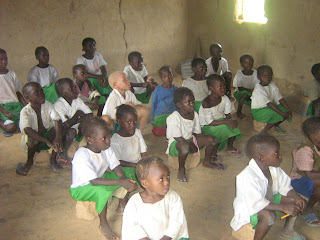As most of you know by now, I’m HOME! And thought it was about time to write a bit about Nigeria, the elections and how I feel about being home.
My last few weeks in Nigeria were pretty hectic, hence the supreme lack of blogging. I had a lovely good bye party from Hope for the Village Child, and the VSOs, friends and neighbours gave me a great farewell at Sea Breeze, our local bar. Then I packed up and travelled over land to Ghana with Richard another volunteer based in Lafia, who has conveniently written a fairly detailed blog of our trip, meaning I don’t have to! See www.monkeyatemyfish.com
 |
| With my HVC colleagues on my last day. |
It feels really good to be home, the reverse culture shock hasn’t been as bad as I’d prepared myself for, supermarkets and crowded bars are still a bit overwhelming, but I’m generally enjoying London living again.
There are a few things that I’ve found new and exciting at home: kettles with upwards on switches (just weird), Crabbies ginger beer (amazing), Groupon (a bit confusing), and some amazing life changes, friends have bought houses, got engaged and have new jobs.
I’ve managed to get some temporary work in my old department at the Red Cross, which is great, and I’m enjoying the double takes I get from people who thought I was still in Nigeria.
The Nigerian elections...
Some of you will have heard about the violence which hit Northern Nigeria during the election, when Goodluck Jonathon was reelected. Some groups in the north of Nigeria rioted claiming the northern Muslim candidate Buhari should have been the president, to continue the north/south power sharing agreement of the main political party the PDP. There are estimates that up to 500 people died, and Kaduna was one of the worst affected areas. Our colleague, Shuaibu, the driver at Hope for the Village Child lost his house, and other colleagues struggled to get home through mobs running street patrols, burning tyres and attacking people. There was an almost immediate 24 hour curfew, and the VSO volunteers were evacuated a couple of days later, but the curfew was still on a month later, and people’s lives cannot be repaired easily. The sad part is that the violence affected the poorest people the most, those who lack opportunities, employment and money and have nothing to lose and so turn on their neighbours who have just as little. The destruction is heart breaking, and it wasn’t just in Kaduna, it happened in Kano, Bauchi and across the north. There’s not much I can really write about it, except to express optimism, that the elections were widely considered the freest and fairest in since Nigeria became a democracy again in 1999, and hope that the people affected will get help to rebuild their lives.
Writing this blog, reflecting on the last year, looking at my photos, and reading the blogs of VSOs still in Nigeria, has made me realise how much I miss it. The year was an incredible experience, challenging, inspiring and overwhelming at all times. I made some amazing friends, who I miss a lot, learnt a hell of a lot about the challenges faced by NGOs working in developing countries, and was exactly where I hoped I’d be, in a passionate organisation that is really making a difference to the lives of isolated rural communities.
My connection with Hope for the Village Child and Kaduna doesn’t end there, I’m now a trustee of Hope for the African Village Child, the British partner charity of HVC. This way I’ll be able to help HVC through fundraising in the future! Recently I lived on £1 a day for five days to raise money for HAVC, and if you’d like to sponsor me, and support HVC’s work with communities who face difficulties accessing health care, education and overcoming poverty in Nigeria, your donations would be very greatly appreciated through: http://uk.virginmoneygiving.com/charities/hopeforafricanvillagechild
Thanks for reading for the last year, and for your support, in Nigeria and at home.
Sai wata rana.





















